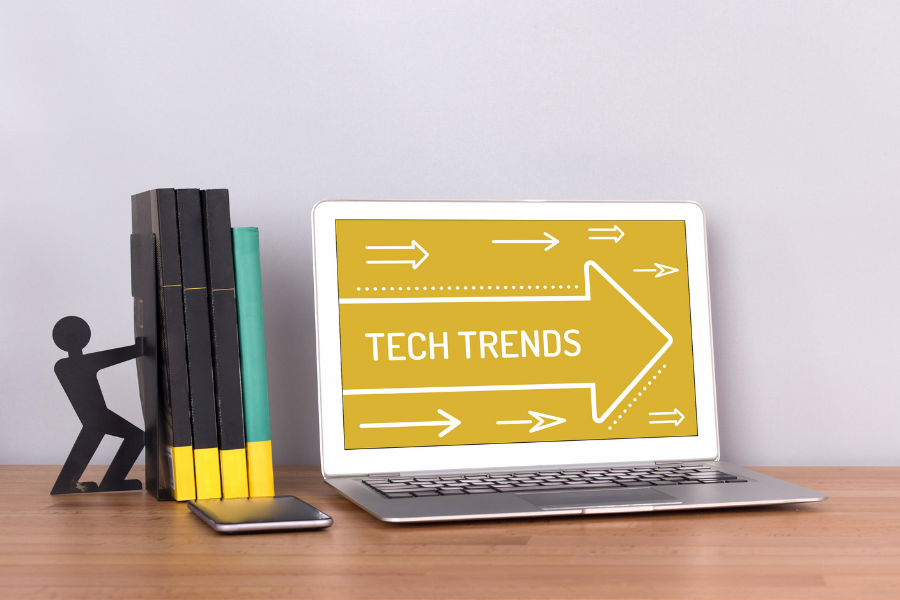2020 transformed the way businesses around the world operated. With COVID-19 lockdowns and the sudden remote working boom, big changes were happening fast all around us.
These sorts of changes didn’t come out of nowhere. For many businesses, modernising their use of technology was on the horizon anyway. The pandemic only meant modernisation had to be implemented now, now, now.
But what about the future? Are these tech trends of last year set to continue in 2021 even as we – hopefully – continue to emerge from lockdown restrictions in the UK and elsewhere in the world?
These are big questions. Especially for companies with growth on their minds.
What will be the big tech trends of 2021/22?
1) Hybrid or remote working
Many businesses found over 2020 that – with the right IT strategies in place – having some or all of their team working remotely was no barrier to effective collaboration.
Large numbers of companies say they may never go back to the way things used to be. Some plan to offer hybrid working options to their teams. Some are even planning to never return to the office at all.
This can be of particular value to companies that are intending to grow, as they can do so unencumbered by some or all of the costs of operating a physical office.
2) Being on the Cloud
One of the key technologies allowing businesses to function in either hybrid or remote setups is cloud computing. There number of businesses suddenly migrating to the cloud exploded in 2020. It’s a trend that looks set to continue well beyond 2021.
Being on the cloud means you are agile. Innovation and growth are facilitated and supported. You also keep costs down.
For most organisations who have even flirted with cloud-based systems, this means the future will almost certainly be “cloud-first”. That is to say, they will look for solutions that are on the cloud before they look to others. This, at the same time as gradually migrating all of their legacy systems and infrastructure across to the cloud.
For more established companies, moving to the cloud usually happens in managed stages. For new start-ups, being “cloud-native” – exploiting cloud computing in all that you do – can often involve a faster switch thanks to a reduced number of legacy issues.
3) Microsoft 365 (and other modern workplace collaboration tools)
Microsoft 365, the Google G-Suite and several other tools – but chiefly Microsoft 365 – have become the staple of many organisations over 2020 and 2021.
It’s easy to see why. Microsoft 365 (formerly Office 365) keeps you secure while encouraging collaboration within your remote-working team. Communications are streamlined and centralised, yet at the same time you have audio and video call functionality, IM (Instant Messaging), file sharing on top of other ways to collaborate.
There are also other platforms – like Microsoft SharePoint, which allows for even more collaboration and communication – that can be easily integrated with Microsoft 365.
4) Post-adoption assessment
The rush to create a remote working setup for employees during the initial COVID-19 panic led many organisations to rush their migration to the cloud and adoption of modern workplace systems like Microsoft 365.
But implementing remote working requires protocols for device management, data protection, software selection and more if security isn’t going to suffer.
Now, with a little breathing room, many organisations are trying to find the time for an assessment of their new processes. Many elements may need to be revisited and built into a proper long-term strategy.
Planning for the future like this should involve developing a full IT roadmap for your organisation. This is vital if you want your IT to grow along with your company.
5) Modernised cyber security
The cyber security measures of yesteryear are no longer able to cope with modern working environments. Especially the kind of remote working and hybrid setups that have become such trends in tech in 2021 and the year leading up to it.
Situations where team members use their own devices – or improperly configured work devices – in varying locations call for different measures than a world in which everything was on your company’s network.
Government-backed standards like Cyber Essentials and Cyber Essentials Plus can demonstrate the cyber security standards you should be adhering to. Organisations that are adopting the tech solutions of the future without the security to back them up are asking for trouble.
Sadly, a potential tech trend of 2021 may well turn out to be businesses who found out how important this was only after they lost data or had costly downtime after a breach.
6) Managed support processes
Old-fashioned IT support services have been replaced by modern managed service providers. Managed services provide support that encompasses a cohesive view of your company’s use of technology rather than only problem-solving when issues arise.
A managed service’s job is to ensure that your company’s current and future use of tech is optimised and planned for during every phase of your growth and expansion. The goal is to have every member of your team able to get the best use of the best available tech solutions for the task at hand with zero downtime or delays.
In the same way that organisations that have adopted modern workplace solutions without modern cyber security measures may suffer in future, those who have adopted modern workplace solutions without the support and expertise in place to do so properly may also find themselves facing IT hurdles to overcome as 2021 continues.
Tech trends in the modern workplace
The clear trends in the direction of the workplace tech pre-2019 – a move towards remote and hybrid working, the adoption of cloud computing solutions, SaaS (Software as a Service) models, distance collaboration tools and so on – was only kicked into overdrive by the global pandemic and related events of 2020 and 2021.
Organisations that have gotten on board with these smart trends while also remembering to assess their initial adoption and further adopt the right security and support systems will be perfectly positioned to adapt and grow in 2021 and beyond.
Looking to perfect your use of the latest tech trends?
Dial A Geek helps nearly 1000 businesses in and around Bristol get the very best from their IT.
Develop your own IT roadmap. Make sure your team are using the best solutions for the tasks at hand. Make your data secure.
Use this booking calendar to set up a commitment-free consultation with Chief Geek Gildas Jones today.
ALL ARTICLES
